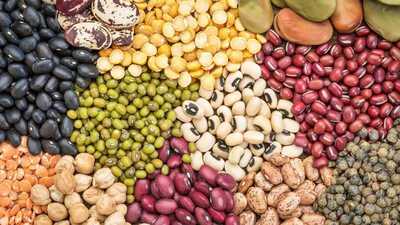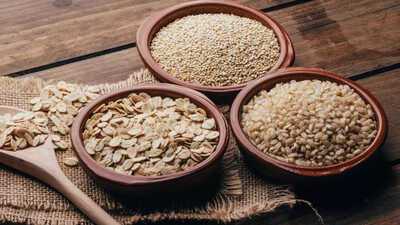A nutritious diet does far more than aid digestion; it can be a powerful defence against serious diseases such as colon cancer. Also called colorectal cancer, the disease occurs when abnormal cells form in the colon or rectum and can spread to other organs if not detected early. Though it has long been considered a condition affecting older adults, doctors are now seeing a worrying increase among younger people, driven by sedentary lifestyles and poor dietary habits. Data from the World Health Organisation (WHO) shows that colon cancer accounted for over 1.9 million new cases and nearly 930,000 deaths worldwide in 2020, underscoring its global health impact.
Highlighting the value of prevention, Dr Saurabh Sethi, MD, MPH, a gastroenterologist trained at Harvard and Stanford, recently shared an informative post on Instagram. He explained that eating foods high in fibre, antioxidants, and probiotics can help reduce inflammation, support gut health, and significantly lower the risk of developing colon cancer.
Video
10 everyday foods that quietly protect you from colon cancer, according to a gastroenterologist
According to a study published in The BMJ, a diet high in whole grains and dietary fibre can significantly lower the risk of colon cancer. Researchers found that individuals who regularly consumed fibre-rich foods such as oats, barley, beans, and lentils had improved digestion, reduced inflammation in the colon, and a healthier gut microbiome, all of which contribute to cancer prevention.
Similarly, a study published in the Nutrition Journal (BioMed Central) reported that regular intake of whole grains was linked to an 11% reduction in colon cancer risk, highlighting how a fibre-rich diet supports colon health by promoting the removal of toxins and maintaining regular bowel movements. These findings reinforce the importance of choosing unprocessed, plant-based foods to quietly protect the colon over time.
Beans and lentils
Beans, lentils, and other legumes are rich in dietary fibre, which supports healthy digestion and helps sweep out toxins from the intestines. Fibre reduces the time spent in the colon, lowering the chances of cell damage or inflammation that can lead to cancer. These foods are also high in plant-based proteins and resistant starch, which nourish beneficial gut bacteria. When gut microbes ferment these starches, they produce short-chain fatty acids like butyrate, known for their anti-inflammatory and anti-cancer properties. Regular consumption of legumes not only promotes smoother digestion and bowel regularity but also supports overall metabolic health, helping to stabilise blood sugar levels and maintain a healthy weight over time.

Broccoli and cruciferous vegetables
Broccoli, cauliflower, cabbage, and Brussels sprouts are part of the cruciferous vegetable family, famous for their detoxifying effects. They contain sulforaphane and indole-3-carbinol, compounds that help neutralise harmful carcinogens and support liver function. Studies suggest that people who regularly consume cruciferous vegetables may have a lower risk of colorectal cancer due to their ability to regulate inflammation and protect DNA from oxidative damage.
Berries
Blueberries, strawberries, raspberries, and blackberries are packed with antioxidants such as anthocyanins, ellagic acid, and vitamin C. These compounds help fight oxidative stress and reduce inflammation in the colon lining. Berries also support healthy cell regeneration and can inhibit the growth of cancerous cells. Adding a small bowl of mixed berries to your breakfast or smoothie is an easy way to harness their benefits daily.
Oats, barley, and quinoa

Whole grains like oats, barley, and quinoa are excellent sources of soluble fibre and beta-glucans, which improve gut health and promote regular bowel movements. A high-fibre diet can dilute potential carcinogens in the digestive tract and support beneficial bacteria. These grains also help maintain a healthy weight and regulate blood sugar, both important factors for reducing cancer risk. Swapping refined grains with whole ones can make a long-term difference in digestive and metabolic health.
Leafy greens
Spinach, kale, lettuce, and other leafy greens provide chlorophyll, folate, and carotenoids, compounds that help repair DNA and protect cells from damage. Folate, in particular, supports healthy cell division and reduces the risk of mutations that can lead to cancer. Including a variety of greens in your meals not only adds fibre but also boosts your intake of vitamins A, C, and K, which enhance immunity and detoxification.
Garlic
Garlic is rich in sulphur-containing compounds such as allicin, which have been linked to reduced cancer risk. These compounds can help inhibit the growth of harmful bacteria, enhance immune function, and slow the spread of abnormal cells. Regular consumption of fresh garlic, whether raw, roasted, or added to meals, supports both digestive and cardiovascular health while providing anti-inflammatory protection to the colon.
Onions
Like garlic, onions belong to the Allium family and contain flavonoids and organosulphur compounds that have protective effects against colon cancer. They help detoxify the body and reduce inflammation in the intestinal lining. Onions also promote the growth of good bacteria in the gut, supporting a healthy microbiome, an important factor in preventing colon and other digestive cancers.
Tomatoes
Tomatoes are abundant in lycopene, a red pigment and potent antioxidant that may lower cancer risk by protecting cells from oxidative stress. Cooking tomatoes enhances lycopene absorption, making tomato sauces, soups, and curries excellent additions to your diet. Alongside lycopene, tomatoes contain vitamin C and potassium, which contribute to overall digestive and heart health.
Yoghurt and fermented foods
Probiotic-rich foods such as yoghurt, kefir, kimchi, and sauerkraut contain beneficial bacteria that promote gut balance. A healthy microbiome strengthens the intestinal barrier, reduces inflammation, and improves immune response. Research has shown that regular intake of probiotics can lower the risk of colon cancer by suppressing the growth of harmful bacteria and supporting nutrient absorption.

Nuts and seeds
Almonds, walnuts, chia seeds, and flaxseeds are nutrient-dense foods high in fibre, omega-3 fatty acids, and antioxidants. These nutrients help regulate inflammation, lower cholesterol levels, and protect colon cells from oxidative damage. Nuts and seeds also promote satiety and stable blood sugar, both essential for maintaining a healthy body weight and reducing cancer risk. A handful of mixed nuts or a spoon of ground flaxseed can be an easy, powerful addition to your daily diet.
Dr Sethi’s advice serves as a timely reminder that small, consistent dietary choices can have a powerful impact on long-term health. While medical screenings and lifestyle habits are essential, a diet rich in fibre, antioxidants, and probiotics provides the foundation for colon protection. Making these foods a regular part of your meals can help strengthen your digestive system, lower inflammation, and reduce the risk of colon cancer, quietly, one bite at a time.
Disclaimer: This article is for general informational purposes only and is not a substitute for professional medical advice, diagnosis, or treatment. Always seek the guidance of a qualified healthcare provider regarding any medical condition or lifestyle change.
Also Read: How a Rs 20 samosa habit can lead to a Rs 3 lakh angioplasty: Delhi doctor warns of the real cost of unhealthy eating
Highlighting the value of prevention, Dr Saurabh Sethi, MD, MPH, a gastroenterologist trained at Harvard and Stanford, recently shared an informative post on Instagram. He explained that eating foods high in fibre, antioxidants, and probiotics can help reduce inflammation, support gut health, and significantly lower the risk of developing colon cancer.
Video
10 everyday foods that quietly protect you from colon cancer, according to a gastroenterologist
According to a study published in The BMJ, a diet high in whole grains and dietary fibre can significantly lower the risk of colon cancer. Researchers found that individuals who regularly consumed fibre-rich foods such as oats, barley, beans, and lentils had improved digestion, reduced inflammation in the colon, and a healthier gut microbiome, all of which contribute to cancer prevention.
Similarly, a study published in the Nutrition Journal (BioMed Central) reported that regular intake of whole grains was linked to an 11% reduction in colon cancer risk, highlighting how a fibre-rich diet supports colon health by promoting the removal of toxins and maintaining regular bowel movements. These findings reinforce the importance of choosing unprocessed, plant-based foods to quietly protect the colon over time.
https://www.instagram.com/reel/DQPIq4dDTNF/ https://www.instagram.com/reel/DQPIq4dDTNF/
Beans and lentils
Beans, lentils, and other legumes are rich in dietary fibre, which supports healthy digestion and helps sweep out toxins from the intestines. Fibre reduces the time spent in the colon, lowering the chances of cell damage or inflammation that can lead to cancer. These foods are also high in plant-based proteins and resistant starch, which nourish beneficial gut bacteria. When gut microbes ferment these starches, they produce short-chain fatty acids like butyrate, known for their anti-inflammatory and anti-cancer properties. Regular consumption of legumes not only promotes smoother digestion and bowel regularity but also supports overall metabolic health, helping to stabilise blood sugar levels and maintain a healthy weight over time.
Broccoli and cruciferous vegetables
Broccoli, cauliflower, cabbage, and Brussels sprouts are part of the cruciferous vegetable family, famous for their detoxifying effects. They contain sulforaphane and indole-3-carbinol, compounds that help neutralise harmful carcinogens and support liver function. Studies suggest that people who regularly consume cruciferous vegetables may have a lower risk of colorectal cancer due to their ability to regulate inflammation and protect DNA from oxidative damage.
Berries
Blueberries, strawberries, raspberries, and blackberries are packed with antioxidants such as anthocyanins, ellagic acid, and vitamin C. These compounds help fight oxidative stress and reduce inflammation in the colon lining. Berries also support healthy cell regeneration and can inhibit the growth of cancerous cells. Adding a small bowl of mixed berries to your breakfast or smoothie is an easy way to harness their benefits daily.
Oats, barley, and quinoa
Whole grains like oats, barley, and quinoa are excellent sources of soluble fibre and beta-glucans, which improve gut health and promote regular bowel movements. A high-fibre diet can dilute potential carcinogens in the digestive tract and support beneficial bacteria. These grains also help maintain a healthy weight and regulate blood sugar, both important factors for reducing cancer risk. Swapping refined grains with whole ones can make a long-term difference in digestive and metabolic health.
Leafy greens
Spinach, kale, lettuce, and other leafy greens provide chlorophyll, folate, and carotenoids, compounds that help repair DNA and protect cells from damage. Folate, in particular, supports healthy cell division and reduces the risk of mutations that can lead to cancer. Including a variety of greens in your meals not only adds fibre but also boosts your intake of vitamins A, C, and K, which enhance immunity and detoxification.
Garlic
Garlic is rich in sulphur-containing compounds such as allicin, which have been linked to reduced cancer risk. These compounds can help inhibit the growth of harmful bacteria, enhance immune function, and slow the spread of abnormal cells. Regular consumption of fresh garlic, whether raw, roasted, or added to meals, supports both digestive and cardiovascular health while providing anti-inflammatory protection to the colon.
Onions
Like garlic, onions belong to the Allium family and contain flavonoids and organosulphur compounds that have protective effects against colon cancer. They help detoxify the body and reduce inflammation in the intestinal lining. Onions also promote the growth of good bacteria in the gut, supporting a healthy microbiome, an important factor in preventing colon and other digestive cancers.
Tomatoes
Tomatoes are abundant in lycopene, a red pigment and potent antioxidant that may lower cancer risk by protecting cells from oxidative stress. Cooking tomatoes enhances lycopene absorption, making tomato sauces, soups, and curries excellent additions to your diet. Alongside lycopene, tomatoes contain vitamin C and potassium, which contribute to overall digestive and heart health.
Yoghurt and fermented foods
Probiotic-rich foods such as yoghurt, kefir, kimchi, and sauerkraut contain beneficial bacteria that promote gut balance. A healthy microbiome strengthens the intestinal barrier, reduces inflammation, and improves immune response. Research has shown that regular intake of probiotics can lower the risk of colon cancer by suppressing the growth of harmful bacteria and supporting nutrient absorption.
Nuts and seeds
Almonds, walnuts, chia seeds, and flaxseeds are nutrient-dense foods high in fibre, omega-3 fatty acids, and antioxidants. These nutrients help regulate inflammation, lower cholesterol levels, and protect colon cells from oxidative damage. Nuts and seeds also promote satiety and stable blood sugar, both essential for maintaining a healthy body weight and reducing cancer risk. A handful of mixed nuts or a spoon of ground flaxseed can be an easy, powerful addition to your daily diet.
Dr Sethi’s advice serves as a timely reminder that small, consistent dietary choices can have a powerful impact on long-term health. While medical screenings and lifestyle habits are essential, a diet rich in fibre, antioxidants, and probiotics provides the foundation for colon protection. Making these foods a regular part of your meals can help strengthen your digestive system, lower inflammation, and reduce the risk of colon cancer, quietly, one bite at a time.
Disclaimer: This article is for general informational purposes only and is not a substitute for professional medical advice, diagnosis, or treatment. Always seek the guidance of a qualified healthcare provider regarding any medical condition or lifestyle change.
Also Read: How a Rs 20 samosa habit can lead to a Rs 3 lakh angioplasty: Delhi doctor warns of the real cost of unhealthy eating
You may also like

Dubai Ruler Sheikh Mohammed highlights holistic education as foundation for future UAE leaders

'One-Stop Centre' providing lifeline to women victims of violence in Chamoli

Moment Liz Truss tears Rachel Reeves excuses to shreds: 'Utter b*******!'

"Bundle of lies": Union Minister Giriraj Singh slams Mahagathbandhan's manifesto

"Everyone gives advice, but funds are necessary": DK Shivakumar after meeting with BJP MP Tejasvi Surya







